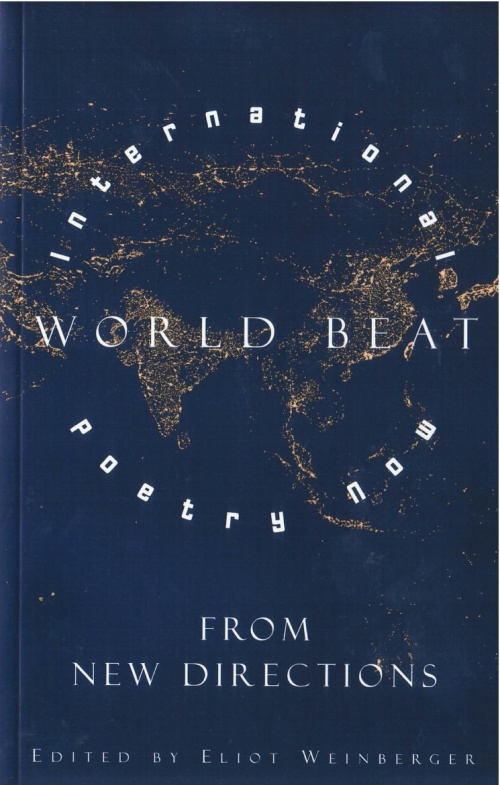Cristina,
As you continue your journey into the world of poetry, I can enthusiastically recommend the following anthologies compiled by Eliot Weinberger:
The New Directions Anthology of Classical Chinese Poetry
American Poetry since 1950: Innovators and Outsiders
World Beat: International Poetry Now
Here are a few cullings…
The New Directions Anthology of Classical Chinese Poetry
Actually, what we want poetry to do is guide lovers toward ecstasy, give witness to the dignity of old people, intensify human bonds, elevate the community, and improve public spirit. And so, it is in just that humanness, that delicate—I’m almost tempted to use the word sweet—appreciation of the details of human life, families, the frustrations of employment with the government, and the frustrations of being a hermit, that we respond to most deeply in Chinese poetry, having a poetry ourselves which is so different in a way, so mythological, so political and so elevated, that it can’t deal with ordinary human affairs often. — Gary Snyder
There is a story that Po always showed his poems to an uneducated old servant-woman, and anything she couldn’t understand, he rewrote. –translator David Hinton
[The Confucian Odes] was conceived as a songbook, with Pound’s oceanic eclecticism finding models from the troubadours to the Elizabethans, hillbilly folk songs to some syncopated boogie-woogie. Rarely discussed by Pound scholars and completely dismissed by Sinologists, The Confucian Odes remains –alongside Samuel Beckett’s anthology of Mexican poetry and Louis Zukovsky’s Catullus—one of the masterpieces of idiosyncratic translation: a radical invocation of the spirits, if not always an accurate transmission of the words. — Eliot Weinberger
American Poetry since 1950: Innovators and Outsiders
… the intention is a hubbub of conversations, not a series of monologues. And the book, as a whole, attempts to serve four functions: as a place to find certain amazing poems; as an introduction to the work of this historical moment; as an alternative to the existing anthologies; and above all, as a signpost pointing to the books of the individual poets. — Eliot Weinberger
Both Duncan and Olson worked on open-ended long poems, much like the Cantos, capable of including anything, and intended to occupy one’s entire writing life. — Eliot Weinberger
I take American poetry to be, with French and Spanish (as written in both the Old and New Worlds), one of the great poetries of the century.– Eliot Weinberger
Categories—-
Conventional, establishment, official, academic
Avant-garde, experimental, non-academic, radical
Free verse v. traditional prosody
Colloquial speech v. literary language
America v. England
Direct presentation v. elaborate metaphor
Closed v. open forms
World Beat: International Poetry Now
All translation sends the essential message that one’s own culture is not enough, and that the way to avoid intellectual stagnation is to learn from other ways of thinking about, perceiving, luxuriating and despairing in the world. This book appears at a moment when the United States is particularly self-absorbed. Less than a fifth of its citizens have passports; a third of its high school students can find the Pacific Ocean on a world map; its rulers dream without embarrassment of a global empire. Poetry, though not the salvation of the world, presents a small alternate model: an endless net of individual dialogues between writers, and between writers and readers, regardless of governments, nations, and communal identities. Its books are a way out of one’s world and a way into the world at large. — Eliot Weinberger
My notes from World Beat
More Bei Dao
Read the book I already have by Kamau Brathwaite
Read several of Anne Carson’s books: on Sappho and Electra, Autobiography of Red
See Forrest Gander’s A Faithful Existence: Reading, Memory, and Transcendence
Explore Nathaniel Mackey’s epistolary prose fiction
See Merton on Parra
Read a lot of Octavio Paz this year
Read a lot of Jerome Rothenberg
As much Shabtai as I can find
Kazuko Shiraishi, Seasons of Sacred Lust
Waldrop’s translations of Edmond Jabes
